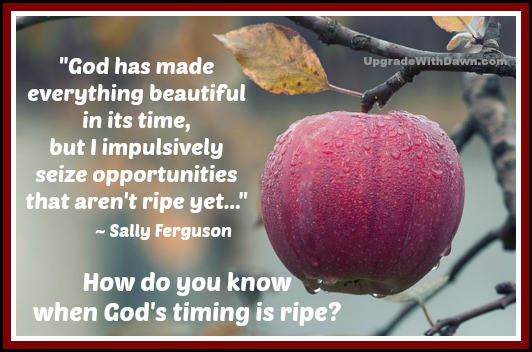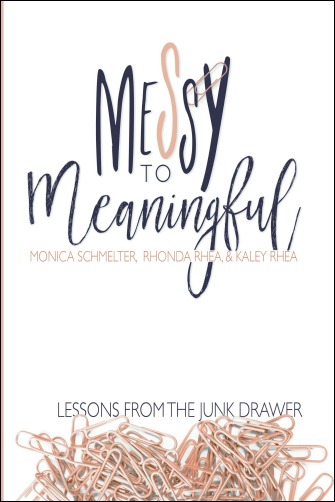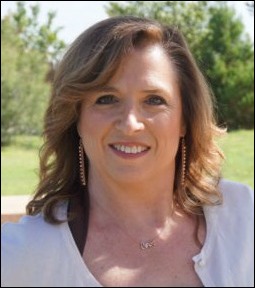Waiting for God's Beautiful Timing
Sally Ferguson, a retreat planner, teaches women how to get away from the craziness of life and wait on the Lord. In this Spiritual Life UPGRADE, she reminds us of a precious principle for intimacy with God.
"I look out the window at my backyard," Sally says, "where reside two apple trees, one Granny Smith and one Red Delicious. My three year old granddaughter persistently reaches for the miniature fruit, hanging on the branches."
"'Not yet,' I tell her. 'The apples need time to grow and get sweeter. Their colors will change when they’re ready.'"
Growing up in the Midwest, I (Dawn) saw many such apple trees. I know exactly what Sally's talking about. It's a beautiful illustration for patience.
Sally continues . . .
I often expect life to be ready, for me, too.
Ecclesiastes 3:11 says God has made everything beautiful in its time, but I impulsively seize opportunities that aren’t ripe yet, and wonder why they taste bitter and feel tough.
Why is there such mystery around when things happen?
Four ways to know when God’s timing is ripe.
1. Do you have a skillset needed for the job?
People have a way of volunteering us for their projects.
While we’re being taught to learn to say “no” for our own sanity, there are times we do need to say “yes,” for theirs.
In John chapter 2, Mary asked Jesus to take care of the punch at a family wedding. Jesus said, “It’s not my monkey, not my circus.” (Not His actual wording!)
But He helped anyway. Verse 7 says He knew what to do, and He helped save the family from great embarrassment in front of their community.
There are times when I know what to do, and need to get involved, even if I think it’s lousy timing.
2. Does it require an act of faith?
Occasionally, I get the most bizarre ideas, yet cannot escape their unrelenting nudge.
Is it me, or is it God’s idea?
The best thing I can do is ask the Lord to make it absolutely clear with my next step.
In Matthew chapter 14, the wind was whipping around Peter’s feet. He had stepped out of the boat to walk with Jesus, but the splashing waves redirected his attention.
When fear crept up, he cried out for help.
Jesus asked Peter to trust Him, but He didn’t change the circumstances first.
Verse 32 says the wind died down when they climbed into the boat. Not before. Not after. But at the right time. Obedience has its reward.
3. Will God get the glory for something bigger than what you could have done?
Matthew 14:33 says the people in the boat worshipped Jesus when they saw what happened.
My impatience demands action. But, when God moves, the “wow factor” usually stops me in my tracks.
It’s at that point I know the result is much more than I dreamt and requires a level of trust previously unknown.
Who am I, to rush God?
Isaiah 5:19 proclaims an indictment on me for telling God to hurry up! He promises He will swiftly take care of things when the time is right (Isaiah 60:22); and He will do it for His own glory (Isaiah 48:11).
4. Do you have peace about the outcome?
Even though we can’t see the future and the outcomes of our choices, we can trust the One who does.
My NIV footnotes say about Psalm 27:3, “Confidence gives us patience to wait for God’s timing and not demand immediate response to our petitions.”
Oh, to have that confidence and complete trust in the Lord!
Why does God appear to be silent when we ask Him to answer our prayers? My friend, Mary Corey said, “It’s to keep us close to Him, when He seems to be taking too long.”
Let the waiting draw you closer to the Lord.
When God is moving, nothing can stop the momentum of His work in our lives. It’s exhilarating to be in that tsunami of change.
However, we have to wait for that to happen. Ephesians 1:9-10 says He is waiting for history to reach its full potential.
Here’s a secret: Mark 1:15 declares the time to be ripe, now, for us to submit to the Lordship of Christ. Let’s act on what we know to do, and wait for God to do His thing.
When we surrender our agendas to Him, He’s never too late.
Are you ready to pause? Use your skillset, faith, trust and confidence in God to guide your resting and waiting for Him to move on your behalf. The fruit will all be worth the wait.
How are you growing while you wait for God’s timing?
Sally Ferguson loves planning women’s retreats. Her coloring book, What Will I Be When I Grow Up? (Warner Press) and ebook, How to Plan a Women’s Retreat are both available on
 Amazon. Visit her latest retreat release here.
Amazon. Visit her latest retreat release here.
Graphic adapted, courtesy of mploscar at Pixabay.
 Post a Comment → Posted on
Post a Comment → Posted on  Tuesday, October 23, 2018 at 8:33AM
Tuesday, October 23, 2018 at 8:33AM  God's Timing,
God's Timing,  Patience,
Patience,  Rest in God,
Rest in God,  Rest in the Lord,
Rest in the Lord,  Sally Ferguson,
Sally Ferguson,  Upgrade with Dawn,
Upgrade with Dawn,  Waiting,
Waiting,  Waiting On God,
Waiting On God,  Women's Retreats Upgrade Your Life
Women's Retreats Upgrade Your Life  Rest,
Rest,  Spiritual Life
Spiritual Life 













